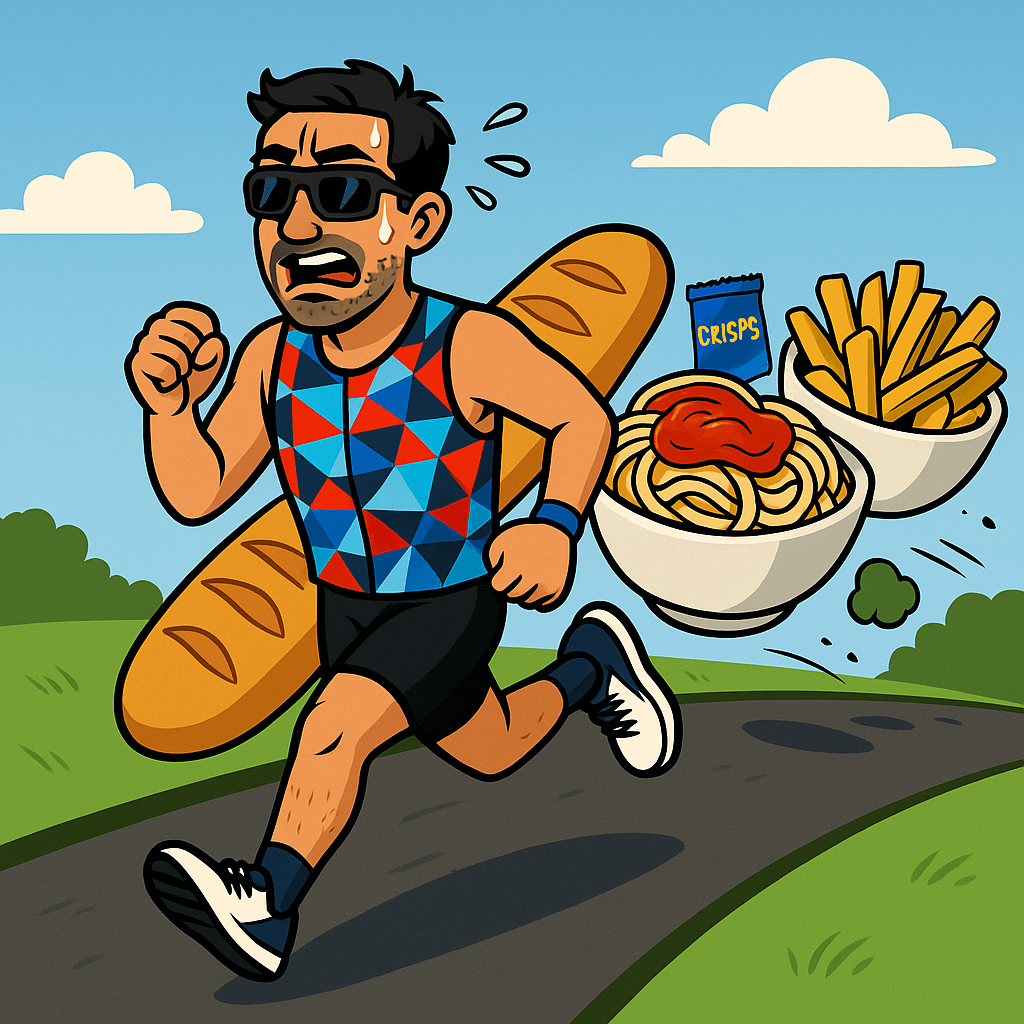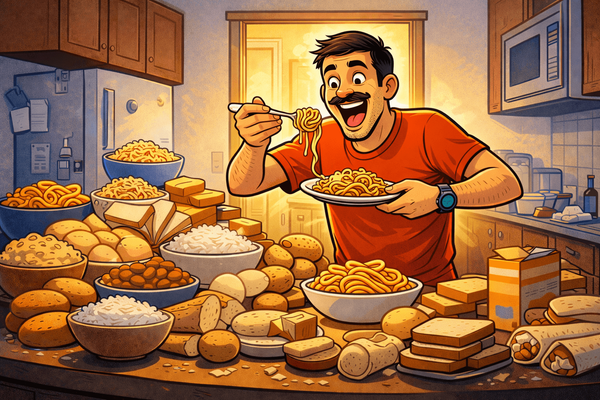How much should you eat during marathon training?
Trying to eat enough for marathon training without ending up face-first in the biscuit aisle.

Somewhere between week three and week twelve of marathon training, you’ll realise this isn’t normal hunger anymore. Your usual dinner will feel like a small snack and you’ll be poking around the cupboards wondering if leftover cake counts as recovery food.
If you’ve got a Garmin (or any other fitness tracker), check how many calories you’re burning and use that as a starting point. If you don't have a fitness tracker, use something like the Mayo Clinic Calorie Calculator, set it to Inactive so it only gives you your resting burn, then add on what you burn from running and whatever else you’re doing. Long runs alone can be worth 500–1,000 kcal an hour, which is basically a free pass to eat your bodyweight in pasta.
You’ll often see guides say marathon runners need “up to 3,000 kcal a day,” but for many of us that’s low-balling it. Smaller runners might land around 2,200–2,800 kcal, a medium sized man is likely to hit 2,800–3,500 kcal, and bigger runners can be well into the 3,500–4,000+ kcal range.
Most importantly, it’s not perfect science: listen to your body, it will tell you when you’ve got it wrong. But it’s a good place to start.
Gaining weight from marathon training
As someone with a complicated relationship with food, my first reaction isn’t always “Great, I can eat more!”, but more “Am I going to put on weight?”
The truth is, if you’re hitting your mileage and include baseline strength work and cross-training as part of your marathon training, you’d have to eat a lot to genuinely gain fat. What is likely to happen however, is a bit of weight gain from increased glycogen storage, water retention, and a bit of extra muscle from all the work you’re putting in. This weight gain can trigger all the alarms and send you into a mental spiral thinking you’re overeating so you eat less and train harder. Speaking from experience: that usually ends with tanking the next run, wondering why you feel like you’ve been hit by a bus and then cry-eating your way through your local Spar’s ice cream selection.
Carbs for marathon training: how much do you need?
Carbohydrates are the main fuel for marathon training, and I’ve been missing the mark badly. I currently push to about 400 g of carbs the day before my long run. It feels like a lot - but according to sports nutrition guidelines, endurance athletes should aim for 6–10 g of carbs per kilogram of body weight per day.
At 80 kg, that’s 560–800 g every single day. Which means my 400 g isn’t just low… it’s very low. And I feel it: runs feel heavier, recovery is slower, and I end up having wild food binges that leave me feeling dirty and full of self-loathing.
If we were to hit just the minimum of 560g of carbs per day eating just one source of carbs, that would be:
- 3.3kg cooked potatoes
- 2kg cooked white rice (~650g dry)
- 1.9kg cooked pasta (~1kg dry)
- 30 slices of white bread
- 720g Haribo Starmix
None of these sound like a reasonable amount to eat (apart from maybe the Haribo Starmix), which is why a mix of different sources is far more manageable.
Protein for marathon training: how much do you need?
Once you’ve got the carbs sorted, it’s time to look at your protein intake. Protein repairs the damage and builds muscle, which is really quite helpful when you’re training for a marathon. I aim for 2g of protein per kilo of body weight (about 160g for me). That’s not just for gym bros - runners need protein too, especially when you’re pushing your body to new limits.
Most of my protein comes from chicken, I have a high tolerance level for how much chicken I can eat in a day. I’m also a big fan of dairy (you wouldn’t think I’m actually lactose-intolerant). Most days, I hit my 160g with a mix of:
- Chicken
- Fat-free cottage cheese
- Low-fat cheddar cheese
- Greek yoghurt (watch out for “Greek style” yoghurt - the protein content is not even comparable)
To mix it up I also throw in some lean beef or pork sometimes, and sporadic vegetarian weeks. If you’re vegetarian, there are plenty of good sources like tofu, seitan and eggs: you absolutely do not need to be a meat eater to get enough protein (although I find it much easier, and cheaper, to do it with meat).
What happens if I don’t eat enough during marathon training?
Your runs will feel harder, if not impossible
Running on empty will force your body to start using fat as its source of energy. While that might sound like a good thing, specially if you want to lose a few pounds, it’s wildly inefficient for your body to use fat as its primary energy source for running, you’ll physically fatigue in no time and you’ll have a terrible time because your brain will be begging you to stop.
Have you ever heard of ‘hitting the wall’? Every runner dreads it because it makes it almost impossible to finish the run you’re doing. The definition of hitting the wall is the point where your glycogen stores are exhausted and your body switches primarily to fat as fuel.
Your body will start failing
We’re not talking about collapsing in the street, but basic functions can take a hit. We're talking RED-S, or Relative Energy Deficiency in Sport. I’ve had short-term memory loss and brain fog from under-eating, plus night cramps that feel like someone’s stabbing my calves. For women, your period may become irregular or stop completely. You might also notice you’re sick more often, recovery drags on, and niggles turn into actual injuries.
You might go on a wild binge
Sustained under-eating will eventually catch up with you. For me, it always ends in a binge. This doesn't come from a place of weakness, but because your body is desperate to fix the deficit. Just last night I had a 15” takeaway pizza, a family-size bag of crisps and a packet of Maryland biscuits. As you can imagine that has left me feeling rather grimy and full of regrets today.
Feed the training, not the fear
Marathon training is hard enough without adding an energy deficit on top. You’re not “cheating” by eating more - you’re doing what your body needs to handle the workload. Trust your hunger, hit your carbs and remember: gaining a few pounds during marathon training is normal, temporary, and unlikely to be fat.





